Science and Policy Talk – Perspectives for science-based policy advice as a young researcher in Switzerland
by Servan Grüninger is President at Reatch member of a cantonal expert commission.
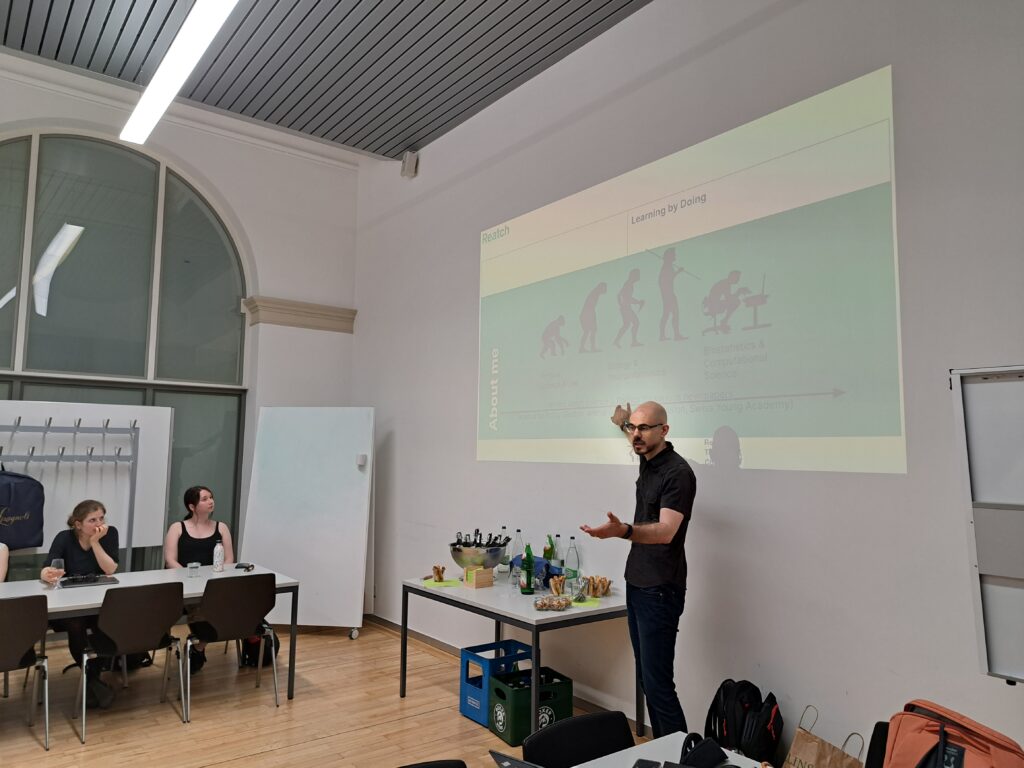
On June 19, 2024, Servan Grüninger will speak about opportunities and pitfalls at the interface of science and policy. He will also talk about his career trajectory and how his education prepared him to take on jobs at the science-policy interface. Furthermore, he will give insights into job prospects at the interface of science and policy.
He will also talk about his career trajectory and how his education prepared him to take on jobs at the science-policy interface. Furthermore, he will give insights into job prospects at the interface of science and policy.
Science and Policy Talk – How ETH aims to strengthen the science-policy dialogue
by Dr. Benedikt Knüsel is Head of Science-Policy Interface in the Office of Knowledge Transfer and Corporate Relations at ETH Zurich.

On October 4, 2023, Benedikt Knüsel will speak about developments at ETH to support the dialogue between scientists and policymakers. ETH is currently taking steps to strengthen these interactions since the contribution and participation of ETH researchers in the design of effective evidence-informed policies is an important pillar of knowledge transfer. These developments happen in the context of both strategic decisions at ETH and political decisions taken in response to the COVID-19 pandemic.
He will also talk about his career trajectory and how his education prepared him to take on jobs at the science-policy interface. Furthermore, he will give insights into job prospects at the interface of science and policy.
Benedikt Knüsel is an environmental scientist by training and holds a doctorate in philosophy of climate science from ETH Zurich, which he obtained in 2020. Before joining ETH as Head of Science-Policy Interface, he was a Scientific Advisor at the State Secretariat for Education, Research and Innovation.
Fireside chat “Zukunft der Landnutzung in der Schweiz unter dem neuen Globalen Biodiversitätsrahmen (COP 15)”
Das Zurich-Basel Plant Science Center und des Franxini-Projekt laden Akteure aus Politik, Wissenschaft, Praxis und der Zivilgesellschaft ein, um in einem offenen Austausch (i.e. Fireside-chat Dialogformat des Fraxini Hive) Lösungen zum Thema «Zukunft der Landnutzung in der Schweiz unter COP15» zu diskutieren.

An diesem Fireside Chat diskutieren wir, was es für die Landnutzung in der Schweiz bedeuten würde, wenn die an der COP15 formulierten Biodiversitätsziele schweizweit umgesetzt werden. Zusammen mit Vertreter*innen aus Wissenschaft, Politik, Verwaltung und Wirtschaft besprechen wir mögliche Lösungen in einem offenen Austausch.
Location:
ETH Zurich
Date:
September 26, 2023
17:00 – 20:30
Die Veranstaltung findet im Rahmen von “RESPONSE – to society and policy needs through plant, food and energy sciences” statt und wird über das EU Rahmenprogramm Horizon 2020 (GA 847585) finanziert.
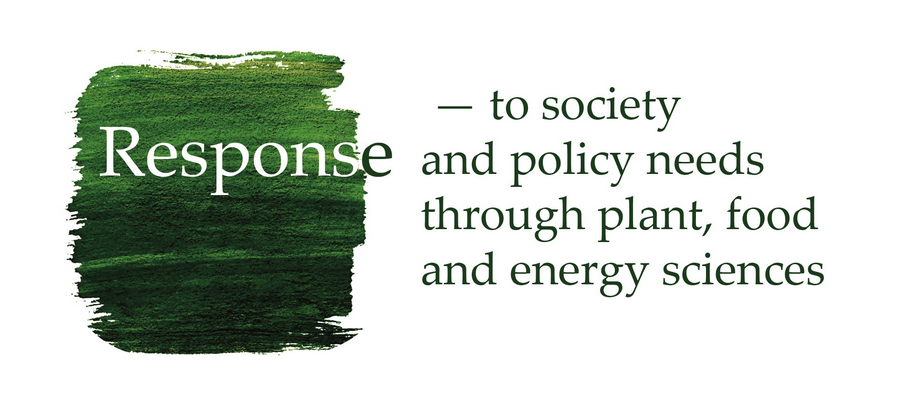

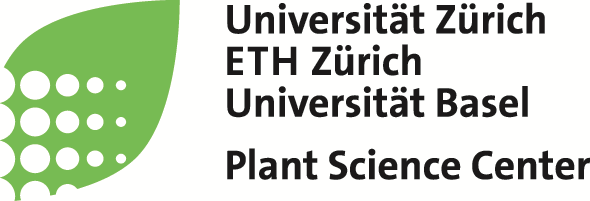
Science and Policy Talk – Politics scholarship for academics – Prepare yourself and submit a successful science and policy application
by Dr. Sophie Girardin (Politics scholarships holder, Scientific Policy Grants)
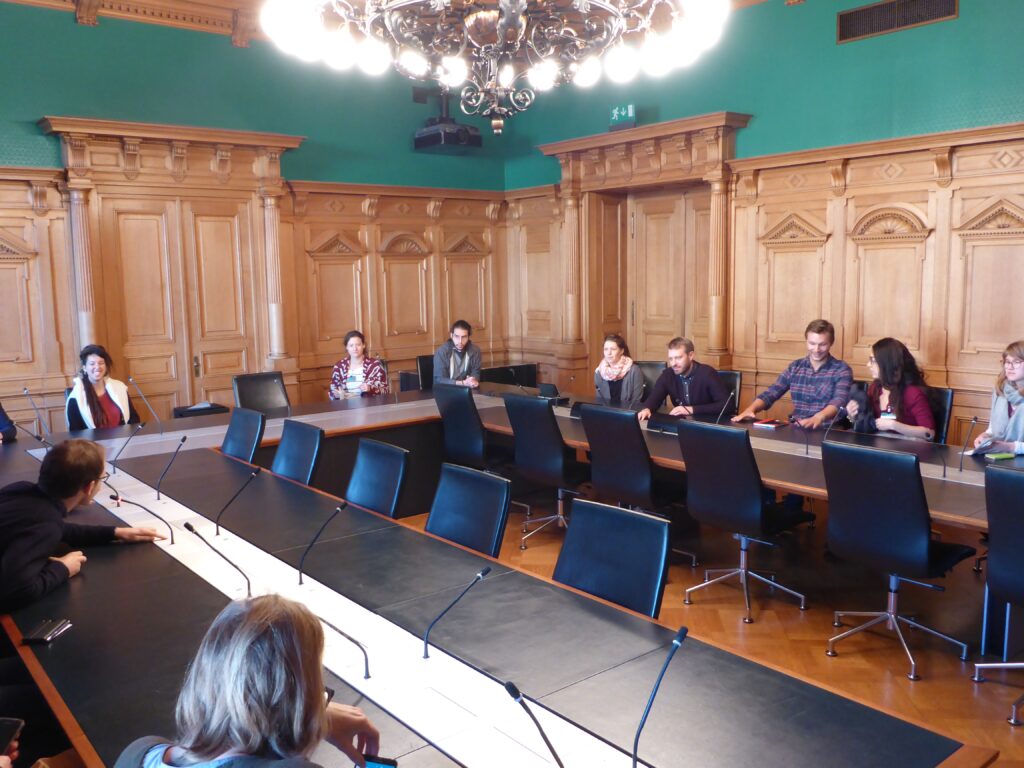
On May 24, 2023, Dr. Sophie Girardin talked about early career researchers can you prepare for a career at the interface between science and policy? In the Science and Policy Talk series professionals working in different roles at the science and policy interface explain how they communicate research findings to have an impact on policies and give us insights in their career pathway.
Dr. Sophie Girardin holds a politics scholarship for academics. The scholarship of Scientific Policy Grants enables each year two graduates of Swiss universities to experience the political processes in the Swiss parliament by working for the Parliamentary Services in the Federal Palace in Berne. The scholarship recipients support the parliamentary legislative committees by joining the team of one of the committee secretary’s offices.
A Mega-Tradeoff: Feeding the World within Planetary Boundaries – RESPONSE Keynote Talk
by Prof. Dr. Dieter Gerten (Potsdam Institute for Climate Impact Research (PIK)
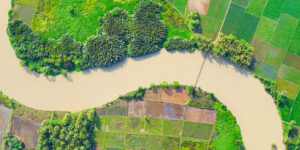
This keynote addresses the question how much food could be supplied globally while respecting multiple Planetary Boundaries – global environmental limits defined as a precaution to possible destabilization of planet Earth. Biophysical simulations suggest that half of current food production depends on transgression of one or more boundaries, i.e. world agriculture is highly unsustainable. However, through ambitious transformative actions toward more sustainable food production and consumption (e.g. diet change, improved water/nutrient management), enough food for 10 billion people could be supplied even within these environmental boundaries. On the other hand, ongoing climate change – as well as methods to sequester additional carbon from the atmosphere through biomass plantations – challenge this outlook, as they increase the pressure on Planetary Boundaries on their own.
Location:
ETH Zurich
Date:
March 15, 2023
16:00 – 17:00
Getting Your Message Across: How to Make Yourself and Your Research Visible – RESPONSE Mentoring Workshop

Location:
ETH Zurich
Date:
March 17, 2023
9:00 – 17:00
In this workshop, participants will learn how to reach a wider audience with your topics and texts and how to prepare and convey your content in an understandable and attractive way in the digital age.
OpenAIRE and Open Access – Increase the Uptake and Impact of RESPONSE Research Results
November 18, 2022, 12:00 – 14:00, ONLINE
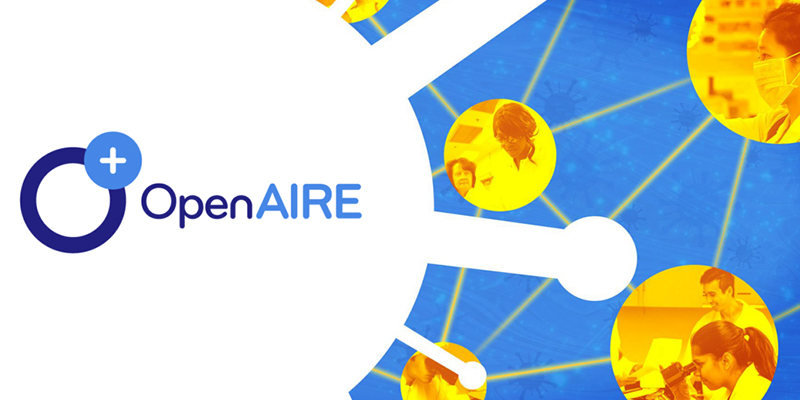
The invited lecturer André Hoffmann is a specialist in the Data Services and Open Access office at the Main Library of the University of Zurich. He will provide insight to publishing infrastructures and requirements related to research manuscripts and data. You will get insight how to deal with your EU open data and open access obligations (H2020, RESPONSE). Moreover, you will dip into resources for increasing the visibility of your research and related outputs (e.g. ORCID, OpenAIRE, etc.).
This event is part of RESPONSE Doctoral Programme (DP) «RESPONSE – to society and policy needs through plant, food and energy sciences» is funded by the European Union’s Horizon 2020 research and innovation program under the Marie Skłodowska-Curie Grant Agreement No 847585.
Slides of the event are available here.
Response Thematic Event: Sustainable Energy System – Who Will Lead the Way?
See the summary from the event!
June 16, 2022, 18:00 – 20:30
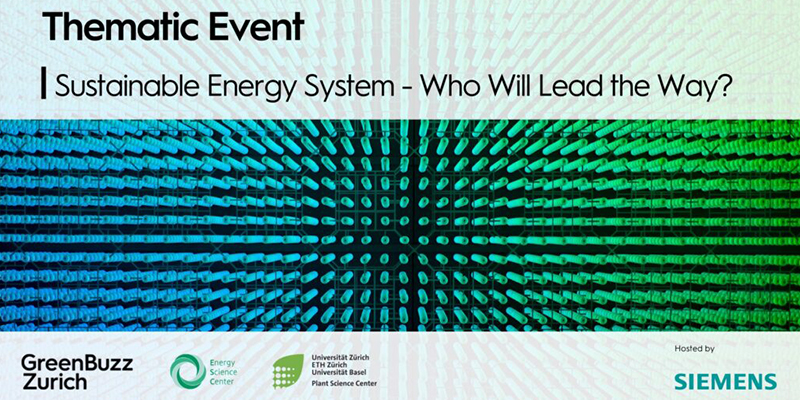
This event is part of RESPONSE Doctoral Programme (DP) «RESPONSE – to society and policy needs through plant, food and energy sciences» is funded by the European Union’s Horizon 2020 research and innovation program under the Marie Skłodowska-Curie Grant Agreement No 847585.
GreenBuzz x ETH World Food Systems Center x RESPONSE: Thematic Event – The Need for Climate Resilient Food Systems.
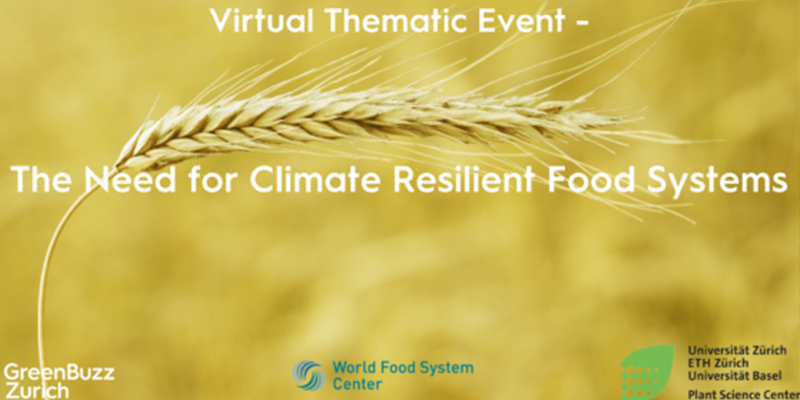
June 2, 2021: 17:30 – 19:30
During the event we will highlight examples from science and industry and talk about the role of different stakeholders in the food system to increase resilience.
Response fellows will host the breakout rooms for participants on:
Can plants switch on and off genes to rapidly adapt to a changing climate? Dusan Denic and Danli Fei, UZH
See the recording from this session
What tools do plant breeders have to improve the resilience of crops? Katharina Jung, Reah Gonzales, Yuanyuan Liang, ETHZ
See the recording from this session
How can fruit and forage production in Switzerland become more resilient? Laurent Giguere, Yutang Chen, ETH Zurich
Research with biological material from abroad – International regulations and due diligence in research
November 5 & 6, 2020
Do you work with biological material from abroad? Do you know, how to correctly proceed with access and benefit sharing, material transferagreements and other procedures?
In this intensive 2-day training workshop with experts from the federal administration the focus is on your research examples and exemplifiedcase studies to demonstrate how to correctly proceed. The course is open to PhD students, postdoc fellows and PIs.
Panel discussion on “What`s next after the EJC judgement on gene editing”
As part of The Tri-National Arabidopsis Meeting (TNAM 2019)
April 10 – 12, 2019
The 200 participants take a tri-national view on the main issues and potential consequences of the ruling of the European Court of Justice (EJC) on organisms obtained by mutagenesis.
Invited guests: Holger Puchta, Karlsruhe Institute of Technology, DE; Armin, Spök, Graz University of Technology Science, Technology and Society Unit, AT; Anne-Gabrielle Wuest-Saucy, Federal Office of Environment, CH
The panel discussion is organized by PlantHUB – European Industrial Doctorate funded by European Union’s Horizon 2020 research and innovation program under the Marie Skłodowska-Curie grant agreement No 722338.
October 24, 2018: Public Round Table “Urban Agriculture – Fad or Future: Should tomorrow’s cities grow their own food?”
October 24, 2018, 17:15 – 19:00
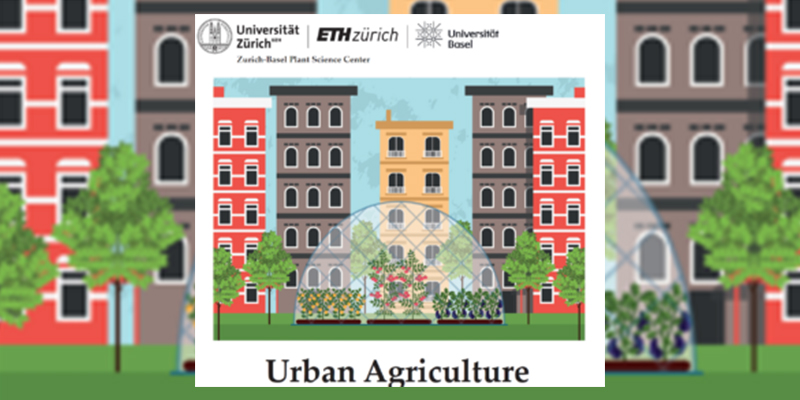
Urban agriculture has the potential to contribute to food security and social well-being in cities while simultaneously increasing overall sustainability of food production.
However, many uncertainties remain with respect to potential risks, limitations, and overall feasibility. During this Public Round Table, experts will discuss future opportunities and challenges in order to inform the public about the manifold aspects of urban agriculture.
Speakers: Giorgio Gianquinto, University of Bologna; Heidrun Moschitz, FiBL; Joëlle Salomon Cavin, University of Lausanne; Fabian Weinlaender, Entrepreneur
PSC summer school „Responsible Research and Innovation in Plant Sciences” at Einsiedeln, Switzerland
September 10-15, 2018
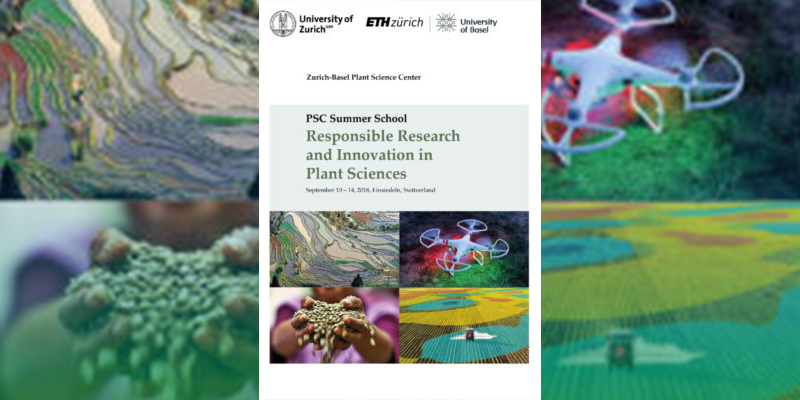
Our summer school series (since 2010) on some of the most tackling topics of current science-society interface has been evaluated positively for years now as mind-opening experience.
Invited speakers: Christian Pohl (ETH Zurich, CH), Daan Schuurbiers (De Proeffabriek, NL), Grégory Grin (Fri Up, CH), Bernadett Oehlen (FiBL, CH), Eduardo Perez (WFSC, ETH Zurich, CH), Jochen Markard (ETH Zurich, CH), Christine Rösch (Institut für Technikfolgenabschätzung und Systemanalyse (ITAS), D), Maria Ferreira dos Santos (University of Zurich, CH), Melanie Paschke (Zurich-Basel Plant Science Center, PSC, CH) and others
This summer school is supported by PlantHUB, a European Industrial Doctoral Programme (EID) funded by the H2020 PROGRAMME Marie Curie Actions – People, Initial Training Networks (GA 722338).
LEMONS OR LEMONADE? PUBLIC ENGAGEMENT WITH SCIENCE: RELEVANCE AND METHODS
April 10, 2017, 9:15 – 16:00
Public engagement with science strengthens the legitimacy of research and will contribute to a more sustainable future. The kind of future researchers want to contribute to is a matter of normative values and social responsibility. Consequently, research is socially, politically and ethically entangled. Because the credibility of science is at stake, public dialogue is imperative and should not be just promises to funding agencies. In this one-day symposium, relevance, approaches and examples of successful public engagement with science will be presented. In workshops, we will discuss what can be gained for science in general and for research projects of participants.
Speakers: Christoph Beuttler, Stiftung Risiko Dialog; Melanie Paschke, Zurich-Basel Plant Science Center (PSC); Brian Wynne, University of Lancaster (UK); Antoinetta Di Guilio, University of Basel; Juanita Schläpfer and Sascha Ismail (both PSC)
BRIDGING SCIENCE AND POLICY – IDP BRIDGES FINAL EVENT 2017
April 5, 2017, 16:15 – 20:00
The Zurich-Basel Plant Center is pleased to invite you to the public final event of the Marie Curie Fellowship program IDP BRIDGES – Bridging Science and Policy. At this event, we will be featuring a key note talk given by Marco Lambertini, Director General at WWF International. He will present highlights of the Living Planet Report 2016. He will show how scientific evidence has been integrated in this report and how researchers can actively contribute to WWF. For example, to strategy papers. Moreover, he will define the role of WWF International as an NGO at the interface of policy, science and the civic sector. Subsequently, the IDP BRIDGES PhD fellows will present and discuss their PhD projects, which they are going to finalize soon.
Program
- 4:15 Welcome and synthesis from IDP Bridges
- 4:30 Keynote talk (Marco Lambertini, WWF International)
- 5:15 Discussion
- 6:00 Presentation of PhD Project pitches
- 6:15 Dialogue session with the IDP Bridges Fellows
- Apéro
